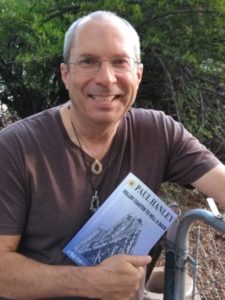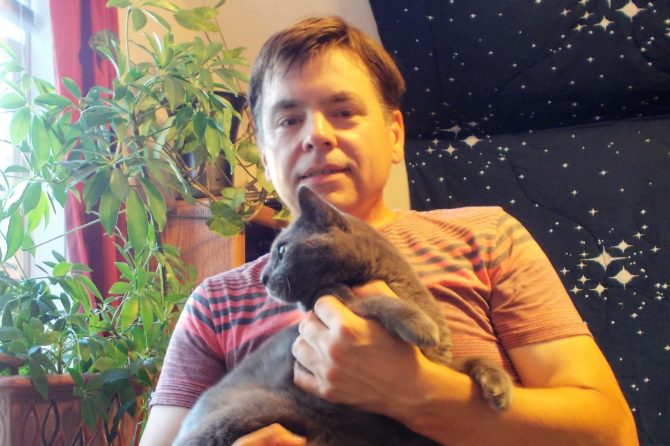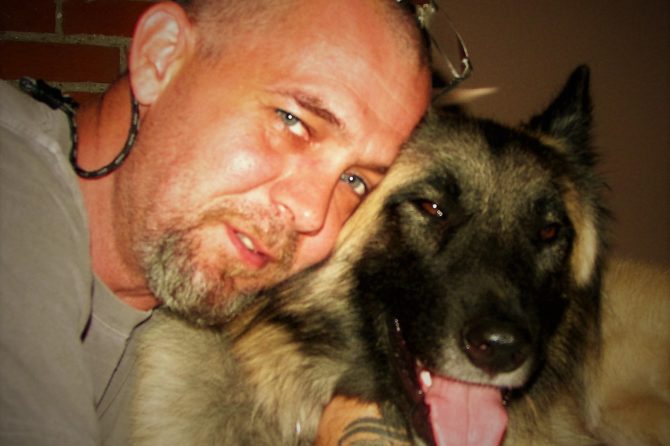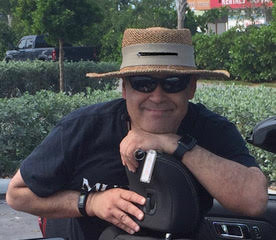
In 1994, I pleaded guilty to a sex offense and have lived on the registry ever since. But my life’s mission now is preventing and healing sexual abuse. To fight abuse, I published my memoir “Roller Coaster to Hell and Back: A True Story of Sexual Abuse and New Hope.” In the book, I describe my recovery from the long-term sexual abuse I suffered as a child, and my rehabilitation after my crime.
I’ve talked in front of other survivors and people who’ve committed sex offenses, so they don’t repeat the mistakes I did. Arizona’s Department of Corrections recently let me talk to inmates at one of their prison Fearless meetings in a segregated yard.
My life has taught me the importance of seeing past the shame that plagues both survivors and people who’ve committed sex offenses. One of the most difficult barriers created for me by the registry has been the shaming—which only worsened the “I’m less-than” feelings from my own childhood abuse. (I, like many survivors, felt responsible for what happened to me.) The worst part was that many people figured if I was ashamed, I must have done something wrong. So they treated me poorly. Shame is a vicious circle.
My childhood dream was a career in writing. Now that I’ve worked through most of my shame, I work for myself as an author and as an editor who helps people on all sides of sexual abuse write and publish their stories. The successes of the authors I’ve met give me hope that one day people on the registry will have a major voice.
I’m no hero, but I’ve done my share to give back. For five years I volunteered at a literacy center helping adult immigrants learn English and pass the US citizenship test. I told the literacy center about my crime right up front. They respected that. Secrecy is behind all kinds of problems, so now that I’m not abusing or being abused, I don’t hide in the shadows any longer.
Just as for registrants, integration into society is difficult for immigrants. I was able to apply what I’ve learned as a registrant to helping my students. We would spend a lot of time on American relationship skills—I’ve found that integration into society, whether for a former offender or an immigrant, is all about developing relationships—with apartment managers, employers, the police, family, neighbors, cashiers …
Another area I’ve helped my community is when I taught tai chi to senior citizens for four years.
Before I committed my offense, I served twelve years in the Arizona Army National Guard. I earned several letters of commendation. Learning to take responsibility for my actions has helped me succeed on the registry. For example, I never used my childhood abuse as an excuse for my crime, even though my childhood set me up to fail. I believe men who commit sex offenses are more likely to have been sexually abused themselves than men who have not committed a sex offense. I hope my work will help these “invisible survivors,” as I call us. I want to prevent abuse, not just heal it after the fact. Most survivors of abuse, however, would never dream of harming someone the way they were harmed. So it’s important to me not to play the victim. Taking ownership of my past has earned me respect from many in my community.
Many therapists and other “experts” claim that “sex offenders cannot be cured.” But whatever other factors come into play, I feel that abuse is ultimately caused by a choice—so choosing not to commit crimes is as good as a cure. I’m making healthier choices now. I’ve gone 25 years without even a traffic ticket.
I’m super grateful for all the people who have believed in me; they helped me believe in myself. I’m not proud of my crime, but I’ve done my time, and I’m making my life a living amends. I have nothing to be ashamed of. All it has really taken is regularly looking for my goodness in the mirror. From there to demonstrating goodness is just a hop, a skip, and a jump.








The title itself says it all. It just feels so good to see people rising from the ashes, maybe a tantamount a title. I have gone through much of what has been stated, but i have remained positive and i believe that someday i will get my Pardon. If not from the state then i have that from my lord and my saviour.. The stories are endless it seems and they are so vicissitudinous if this is the right word… I dont know if the current feelings or laws will change for some of us, but i pray they do.
I have been through 14 years now of my recovery, and discovery. I like to read someone else’s perspective, opinions, and how they manage their survival and recovery. Thank you Paul,for your courage to share, and to challenge yourself in ways I’m not quite ready to. In a well known group, a derivative of AA, I was once given a different opinion on guilt and shame. She told me that in her understanding, guilt takes only one person, to shame, it takes more than one. I’m still working on both, especially in my current circumstance of registry.
I think thre hardest part of being a survivor, is working through my childhood incest, and coming up with an answer as to why I didn’t tell anyone. I think the key is early treatment. Like cancer, I believe it’s critical to be addressed in the earliest detectable stages. So why did I keep it to myself? Fear of so many societal roadblocks that have never been talked about, so the fear never changes for the next generation. I’m sure most can come up with an example of why they never told, my daughter did
Hi my name is Joann my grandson is in a federal prison at the present time for 20 years. I will not say he’s innocent was arrested for extortion of a minor . He had no contact with this individual. He had a public defender. He was sexual abused at a very early age by a step father and never received counseling. I would like to help this young gentlemen. He grew up in an abusive household and continues to pay the price because of his unfit mother. His mother is my step daughter unfortunately my husband died almost 15 years ago. My husband loved him very much and tried to help him. Don’t know what I can do to help him
Hi Joann,
I’m sorry for the huge delay in my response (I had not seen any comments on this site in quite a while so got out of the habit of checking it) – but I feel even worse about your grandson’s situation.
I must give the disclaimer that I speak not as a mental health professional, only from a place of my own experience in boyhood sexual abuse recovery.
If there is any way you can help your grandson get professional help, that would be ideal. But I know very few resources are available in prison.
And recovering from childhood sexual abuse while incarcerated can be very challenging, because in that environment, which itself can be traumatizing, people often feel the need to protect themselves by not disclosing vulnerable feelings. But in my experience, getting the painful secrets “out there” as objects we can look at a little more objectively, and get some control over, so they are not rattling around inside our heads controlling us, is a crucial step in recovery. Still, I have talked to men who only started to really work on their victim issues when behind bars, so there is hope.
If your grandson is a reader, the book most helpful in my recovery is: “Beyond Betrayal: Taking Charge of Your Life after Boyhood Sexual Abuse,” by Richard Gartner:
https://www.amazon.com/Beyond-Betrayal-Taking-Charge-Boyhood/dp/1630260363/ref=sr_1_1?crid=3PS55TTU0HMG8&keywords=beyond+betrayal&qid=1570370161&s=books&sprefix=Beyond+betray%2Caps%2C293&sr=1-1
I would be glad to talk more with you to see if we can brainstorm something that will help your grandson. You can contact me through the contact form on my website:
https://www.pauldhanley.com/contact.html
Are there any similar books you can recommend for women offenders abused as children?
Thank you.
Paul,my son is in county jail right now. Because of the current pandemic visits are cancelled as are all courts so we don’t know what he’ll get. He was charged with rape 2 & 4 other charges. 2 misdemeanors & 2 more felonies. He recently told me via phone call that he has a problem with sex addiction. He’s 42 & the girl was a lot younger!!
I’m not angry with him & I’m not judging, I’m supportive & I still love him. I can’t stop loving my son ❤️ no matter what. He has a public defender. My husband (his step dad) & I are retired.
I don’t believe he was abused as a child. I was an unwed young mom & my parents helped me raise him.
Your story as well as all the other ones I’ve read are so inspiring! Right now I can’t share these stories with h bit hopefully some day soon.
I chose to comment on your story because my son has also inspired to write. He’s working on his first book & also wants to write an autobiography. You would be an inspiration to him.
God bless ? you & may you have continued success! I’d love to read your book!
Hi Debbie,
I’m sorry you, your son, and your other loved ones are facing all this. I admire your willingness to go so far as to sell your house in an effort to help your son succeed. I wouldn’t have made it this far after my release from the state hospital if my mom hadn’t helped me find a place to live, and helped me get back into school, get to appointments with my PO and therapists, etc. You loved ones of registrants are truly a Godsend! And I’ve often said that loved ones sometimes get shamed more than we on the registry do. Your courage in looking past the label to the precious person, in spite of all the pressure to join the haters, is an example for all of us.
I’m afraid I don’t have a lot of resources, but here are a few:
First, wherever you live, try to seek out or start a Fearless support/education group. These are designed specifically for people on the registry and their family members, so both you and your son will benefit from them. NARSOL has a page specifically on Fearless Groups: https://narsol.org/projects/support/fearless/
You might contact NARSOL to see if there are Fearless groups in the areas you’re contemplating moving to.
Second, one tool you might find useful in your search is the “50-state comparison of relief from sex offender registration obligations”: http://ccresourcecenter.org/state-restoration-profiles/50-state-comparison-relief-from-sex-offender-registration-obligations/
The approach I would take to that tool is to rule out some of the stricter states: Florida, Michigan, Texas, Arizona, Illinois, and so on. I’m sorry I can’t actually recommend a good state and county, because I’ve lived for so long in one place, and not a good one. Still, if you move to AZ, we have a great Fearless group and AZRSOL is a great NARSOL affiliate.
Third, I’ve recently become a big fan of LifeTimes magazine: https://www.lifetimesmagazine.org/
They are all about registrants and loved ones “Finding Life’s Joys in the Face of Adversity.” Disclaimer: The most recent issue published one of my articles, so I admit I’m a bit prejudiced. But I really do believe in LifeTimes, and am not making any money from them. The thing about LifeTimes is they have a page of resources in the back of each issue, which lists organizations such as NARSOL affiliates that might help you. But be careful about choosing a state to live in based on the quality of the organizations there, because most of the ones listed in LifeTimes are in states with very strict laws on registrants. It appears to me that only when a state gets absurdly tough does a strong registrant-advocacy group develop
Other good places to find resources are SOSEN: https://sosen.org/
and
Women Against Registry: https://ww1.womenagainstregistry.org/
Of course if you haven’t checked out all of NARSOL’s resources, start there!!!: https://narsol.org/
Finally, I recently became aware of New Persons Ministries, and specifically, an inspirational person named David Garlock. Their website is at: http://www.newpersonministries.org/
You can find David’s email by clicking “Contact.” He is a survivor of sexual abuse who killed his abuser and served time for it, but now helps people with sex offenses on their records reintegrate into society. New Persons Ministry only operates in certain parts of Pennsylvania, but they might be able to help you locate more resources.
I have heard of the Veteran Justice Outreach Program but maybe other readers haven’t, so thanks for posting the tip!
I apologize for the delayed response. I will check this website for comments more frequently in the future.
–With respect and love,
Paul
Dave,
I enjoyed reading your story. I wish the best for you and your family. As you, my son served 12 years in the Air Force. He is still serving time, 20 months, in the brig. I have read on the computer about some services, Veteran Justice Outreach Program, that will help him when he gets out next August. His biggest fear is that his son will not be able to live in the same house hold as him while on parole. And, that he will not be able to continue his career in IT. He wants to program computers using C++. His offence in not computer related, so maybe they will let him work and finish college in his field. Have you heard any of the assistant programs that help SO.
We are also looking at the different states that would be a better place to live. I am willing to put my home on the market and sell it so that we can have a cushion when we find a new home text year. Thank you for any advice. Sincerely, Debbie
Sounds like you’ve earned the right to live free from shame. I like what you said about relationships. As I’ve matured the quality of my life is defined by the quality of my relationships. Thanks for sharing your experience and wisdom!
Thanks, Dave. You said, “As I’ve matured the quality of my life is defined by the quality of my relationships.” I couldn’t agree more. I’ve had to cut some people out of my life, and people have cut me out of theirs – and I won’t deny the pain of that. But that attitude you express of quality-integration, where there is a fit between the people we spend time with and our lives as a whole is often the difference between a frustrating life and a successful, rewarding one. Loved ones should add to our lives, and we to theirs.
One of the great tragedies of the registry is the isolating it does, to the point that many people who read this don’t have the luxury I now do of picking and choosing my friends. They are lucky to find one person willing to stand by them through thick or thin. I know, I’ve been there. But I really want to assure them that if they remain true to themselves, looking for their precious humanity in their eyes in the mirror every day, looking past the shaming lies that they are “incurable deviants,” there IS light at the end of the tunnel. I say to all of them: For God’s sake, for your sake, for all our sakes, Don’t give in to despair! Don’t rob us of the gifts only you can share with us. Act like the gift you are and the people who really count will notice.
That reply was beautiful and encouraging. Thank you for sharing that. While I am not an abuser, I was abused for the first 12 years of my life. And now have someone I love dearly paying for her, yes her mistake, still in prison. Her experience has changed my perception of people who offend. I’ve listened. I’ve cried with her and seen what something like this can do to a prtsond life and their very spirit. I would love to hear some insight and encouragement I could pass on to her as she will soon face the affects of living with her name on the registry and how all of this will affect her husband and children moving forward. Not letting her offense become her identity or theirs. Anyone, please share your thoughts and insight. I’m by her side always. But reading these stories hurts to know how much work needs to be done and how can I be part of helping. I will continue with her for now.
Pail Hanley – you said you help people write their stories. Could you reach out to me please?
Hello Julie,
It sounds like you have an interesting story to share. We have a space on https://tftr.narsol.org for people to submit their stories. However, I think it sounds like you have a unique story that highlights some areas that are not often looked at. For that reason, I would like to invite you to submit your story to communications@narsol.org. Perhaps our communications director will see it as something important that should be shared with our wider audience and she may be able to work with you on it. You can remain anonymous if you prefer. I just thought I should let you know about these option. Thank you for participating in the comments here.
Thank you for responding Paul. I will do that. I went searching for your book. How can I get a copy? I’d love to read it and share it with my niece when she is released.
I’m so sorry for the delay, Julie. Life gets in the way sometimes.. Yes I help people tell their stories. You can reach me at ph361417@gmail.com